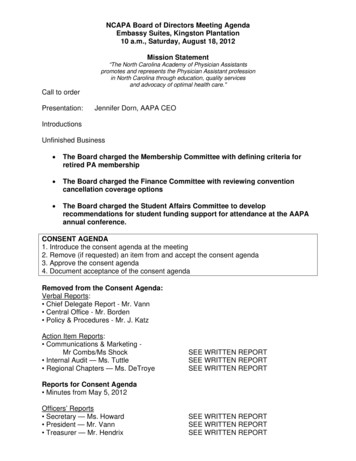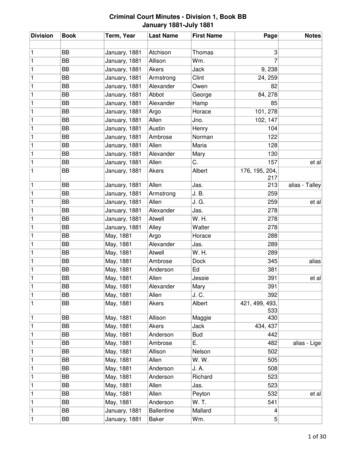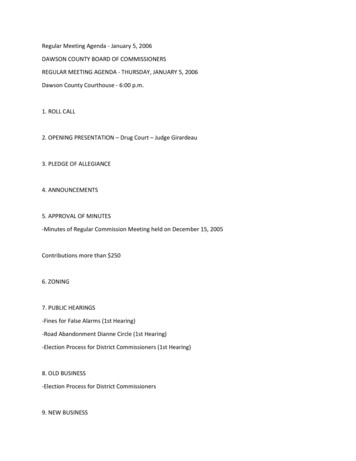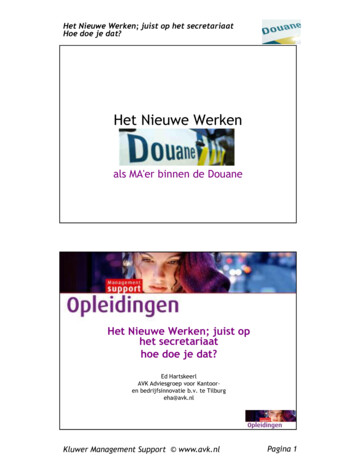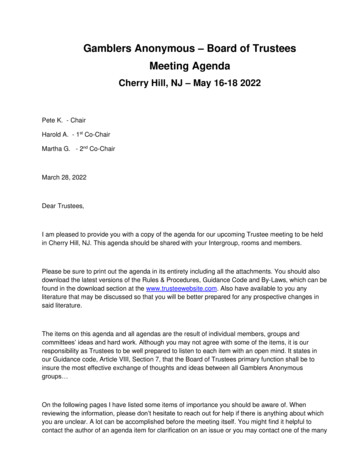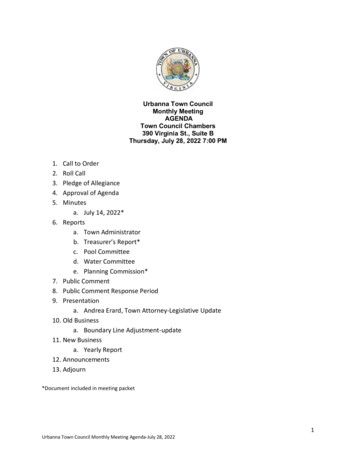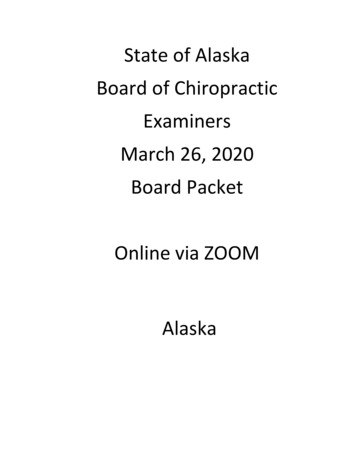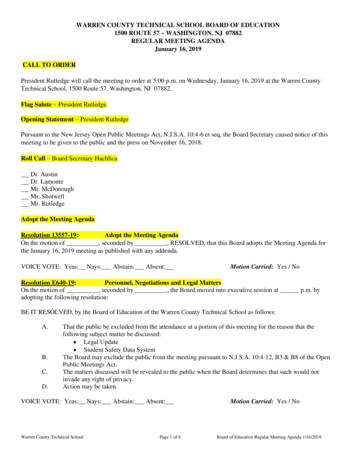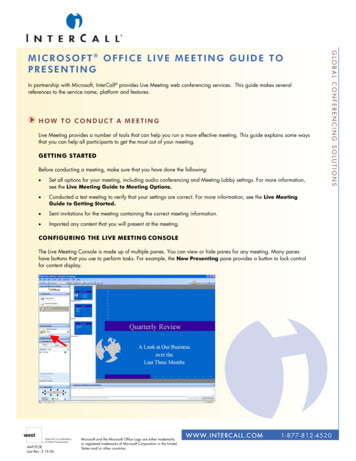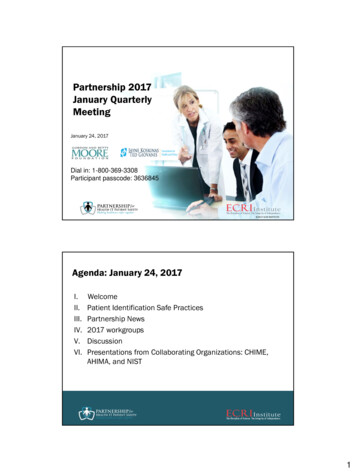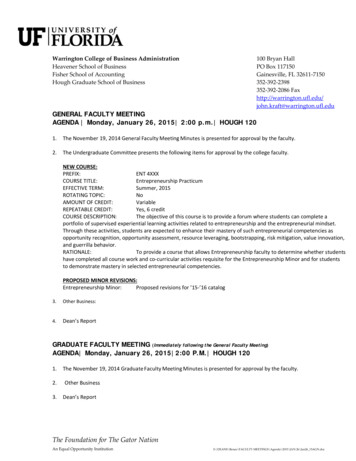
Transcription
Warrington College of Business AdministrationHeavener School of BusinessFisher School of AccountingHough Graduate School of Business100 Bryan HallPO Box 117150Gainesville, FL 32611‐7150352‐392‐2398352‐392‐2086 .ufl.eduGENERAL FACULTY MEETINGAGENDA Monday, January 26, 2015 2:00 p.m. HOUGH 1201.The November 19, 2014 General Faculty Meeting Minutes is presented for approval by the faculty.2.The Undergraduate Committee presents the following items for approval by the college faculty.NEW COURSE:PREFIX:ENT 4XXXCOURSE TITLE:Entrepreneurship PracticumEFFECTIVE TERM:Summer, 2015ROTATING TOPIC:NoAMOUNT OF CREDIT:VariableREPEATABLE CREDIT:Yes, 6 creditCOURSE DESCRIPTION:The objective of this course is to provide a forum where students can complete aportfolio of supervised experiential learning activities related to entrepreneurship and the entrepreneurial mindset.Through these activities, students are expected to enhance their mastery of such entrepreneurial competencies asopportunity recognition, opportunity assessment, resource leveraging, bootstrapping, risk mitigation, value innovation,and guerrilla behavior.RATIONALE:To provide a course that allows Entrepreneurship faculty to determine whether studentshave completed all course work and co‐curricular activities requisite for the Entrepreneurship Minor and for studentsto demonstrate mastery in selected entrepreneurial competencies.PROPOSED MINOR REVISIONS:Entrepreneurship Minor:Proposed revisions for ’15‐’16 catalog3.Other Business:4.Dean’s ReportGRADUATE FACULTY MEETING (Immediately following the General Faculty Meeting)AGENDA Monday, January 26, 2015 2:00 P.M. HOUGH 1201.2.3.The November 19, 2014 Graduate Faculty Meeting Minutes is presented for approval by the faculty.Other BusinessDean’s ReportThe Foundation for The Gator NationAn Equal Opportunity InstitutionS:\DEANS\Renee\FACULTY MEETINGS\Agenda\2015\JAN 26\Jan26 15AGN.doc
Warrington College of Business AdministrationHeavener School of BusinessFisher School of AccountingHough Graduate School of Business100 Bryan HallPO Box 117150Gainesville, FL 32611‐7150352‐392‐2398352‐392‐2086 .ufl.eduGENERAL FACULTY MEETINGMINUTES WEDNESDAY, NOVEMBER 19, 2014 4:00 p.m. HEAVENER 2401.A motion was made to approve the October 6, 2014 General Faculty Meeting Minutes. The motion was seconded andthe faculty voted to approve the minutes as presented.2.Proposed changes to the College Bylaws were presented as an informational item at the 10/6/14 meeting. Thesechanges were presented for approval by the college faculty at this meeting. A motion was made to approve thechanges to the College Bylaws. The motion was seconded and the faculty voted to approve the college bylaws aspresented.3.A motion was made to approve the following items as presented by the Undergraduate Committee. The motion wasseconded and the faculty voted to approve the following items:Course Change: (approved)Prefix/course#:GEB 4906Effective Term:Spring 2015Rationale:To allow students pursuing research to register for credit for tracking purposes at no tuitionbearing expense to them.The Undergraduate Committee presents the following item for approval by the college faculty:‐General Education changes to the BSBA and BABA (attachments) (approved)4.Rich Lutz gave a brief update on Teaching Committee activities. The “third” draft document was presented at the meeting.‐Revised AACSB standards‐Faculty Teaching Portfolios‐PhD student teaching training and awards5.Dean’s Report:A motion was made to adjourn. The motion was seconded and the meeting adjourned.GRADUATE FACULTY MEETING (Immediately following the General Faculty Meeting)MINUTES WEDNESDAY, NOVEMBER 19, 2014 4:00 P.M. HEAVENER 2401.A motion was made to approve the October 6, 2014 Graduate Faculty Meeting Minutes. The motion was seconded andthe faculty voted to approve the minutes as presented.2.A motion was made to approve the items as presented by the DBA Committee. The motion was seconded and thefaculty voted to approve the following items as presented.PREFIX:FULL COURSE TITLE:EFFECTIVE TERM:CREDIT:MAR 7XXXMARKETING STRATEGY SEMINARSPRING 20153The Foundation for The Gator NationAn Equal Opportunity InstitutionS:\DEANS\Renee\FACULTY MEETINGS\Agenda\2015\JAN 26\Nov19 2014MIN.doc
CONTACT HOUR:BASE 24 / HEADCOUNT 25DESCRIPTION:This doctoral‐level course will expose students to research on four key areas within marketing strategy(i) Philosophy and methods (ii) Customer strategy (iii) Brand strategy, and (iv) Strategy performance. We will examine thesetopics through a seminar that will discuss, critique, and extend the extant literature. Course readings cover both classic andstate‐of‐the‐art articles in marketing strategy. Students will be encouraged to challenge assumptions, frameworks, andfindings in these readings.RATIONALE:The course will offer a springboard for new research questions, ideas, and frameworks to enrich andextend understanding on marketing strategy by management practitioners and applied researchers. It emphasizessubstantive (vs. conceptual) research questions, applications, (as opposed to development) of theory, and practical (asopposed to novel) empirical contribution.PREFIX:MAR 7627FULL COURSE TITLE: QUANTITATIVE RESEARCH METHODS AND DATA ANALYSISEFFECTIVE TERM:SPRING 2016CREDIT:3CONTACT HOUR:BASE 24 / HEADCOUNT 29DESCRIPTION:This doctoral‐level course introduces multivariate data analysis and mathematical models in marketingtheory often called marketing science. This course covers basic and advanced multivariate data analysis with applications forbusiness, marketing research and consumer behavior. Course readings cover both classic and state‐of‐the‐art articles inmarketing science.RATIONALE:This course is similar to MAR 7626 (multivariate analysis) for PhD students. However, the course istargeted toward D.B.A. students. Hence, the course emphasizes research‐based profession practice (vs. purely scholarlyresearch), applied research (vs. theoretical research) and rigor (vs. novelty and contribution). The course is more theory‐based than an M.B.A. course but stresses theory development less than an advanced PhD research course.4.5.Other Business ‐ noneDean’s Report‐ Heavener Hall completed‐ Moves are will be taking place next week‐ All classes will be held in Heavener during the spring‐ The college will be recruiting for (5 or 6) faculty: Marketing, Management, and Finance.‐ The new President will arrive January 2, 2015A motion was made to adjourn the meeting. The motion was seconded and the meeting adjourned.Attendance: John Kraft, Selcuk Erenguc, Tawnya Means, Amanda Phalin, Robert Thomas, Richard Lutz, Mike Ryngaert, JaneDouglas, Bart Weitz, Alan Cook, Aner Sela, Joe Alba, Asoo Vakharia, Angie Holland
UCC1: New Course Transmittal FormRecommended SCNS Course Identification2.Level 43.Number XXX1.Prefix ENT5.Course Title Entrepreneurship Practicum6.Transcript Title (21 character maximum) Entrepreneurship Pract.7.Effective Term Summer8.Effective Year 20154.9.Lab Code SelectRotating Topic? No10. Amount of Credit Variable11. If variable, 0 minimum and 4 maximum credits per semester.12. Repeatable credit? Yes13. If yes, total repeatable credit allowed 614. S/U Only? Yes16. Degree Type Baccalaureate15. Contact Type Directed Individual Studies [0.5 headcount hr]17. If other, please specify: Click here to enter text.18. Category of Instruction Intermediate19. Course DescriptionThe objective of this course is to provide a forum where students can complete a portfolio of supervisedexperiential learning activities related to entrepreneurship and the entrepreneurial mindset. Through theseactivities, students are expected to enhance their mastery of such entrepreneurial competencies as opportunityrecognition, opportunity assessment, resource leveraging, bootstrapping, risk mitigation, value innovation, andguerrilla behavior.20. PrerequisitesN/A21. Co‐requisitesN/A22. Rationale and Placement in CurriculumTo provide a course that allows Entrepreneurship faculty to determine whether students havecompleted all course work and co-curricular activities requisite for the Entrepreneurship Minor and forstudents to demonstrate mastery in selected entrepreneurial competencies.23. Complete the syllabus checklist on the next page of this form.UCC1: New Course Transmittal FormRevised 1/20/2015UF, Academic Affairs
Syllabus Requirements ChecklistThe University’s complete Syllabus Policy can be found ies/syllabi policy.pdfThe syllabus of the proposed course must include the following:Course titleInstructor contact information (if applicable, TA information may be listed as TBA)Office hours during which students may meet with the instructor and TA (if applicable)Course objectives and/or goalsA weekly course schedule of topics and assignments.Methods by which students will be evaluated and their grades determinedInformation on current UF grading policies for assigning grade points. This may be achieved byincluding a link to the appropriate undergraduate catalog web ions/info/grades.aspx.List of all required and recommended textbooksMaterials and Supplies Fees, if anyA statement related to class attendance, make‐up exams and other work such as: “Requirements forclass attendance and make‐up exams, assignments, and other work in this course are consistent withuniversity policies that can be found in the online catalog ns/info/attendance.aspx.”A statement related to accommodations for students with disabilities such as: "Students requestingclassroom accommodation must first register with the Dean of Students Office. The Dean of StudentsOffice will provide documentation to the student who must then provide this documentation to theInstructor when requesting accommodation."A statement informing students of the online course evaluation process such as: “Students areexpected to provide feedback on the quality of instruction in this course based on 10 criteria. Theseevaluations are conducted online at https://evaluations.ufl.edu. Evaluations are typically open duringthe last two or three weeks of the semester, but students will be given specific times when they areopen. Summary results of these assessments are available to students athttps://evaluations.ufl.edu/results.”It is recommended that the syllabus contain the following:Critical dates for exams or other workClass demeanor expected by the professor (e.g. tardiness, cell phone usage)The university’s honesty policy regarding cheating, plagiarism, etc.Suggested wording: UF students are bound by The Honor Pledge which states, “We, the members of theUniversity of Florida community, pledge to hold ourselves and our peers to the highest standards ofhonor and integrity by abiding by the Honor Code. On all work submitted for credit by students at theUniversity of Florida, the following pledge is either required or implied: “On my honor, I have neithergiven nor received unauthorized aid in doing this assignment.” The Honor �conduct‐honor‐code/) specifies a number of behaviorsthat are in violation of this code and the possible sanctions. Furthermore, you are obligated to reportany condition that facilitates academic misconduct to appropriate personnel. If you have anyquestions or concerns, please consult with the instructor or TAs in this class.Contact information for the Counseling and Wellness Center: http://www.counseling.ufl.edu/cwc/,392‐1575; and the University Police Department: 392‐1111 or 9‐1‐1 for emergenciesUCC1: New Course Transmittal FormRevised 1/20/2015UF, Academic Affairs
SYLLABUSCourse Title:ENT 4XXX – Entrepreneurship PracticumInstructor:Dr. Michael Morris, Prof. Bill Rossi, Prof. Jamie KraftOffice Hours:By appointmentContact:Center for Entrepreneurship and InnovationOffice: Bryan 133Telephone: (352) 273‐ 0336Office Hours: by appointmentWebsite: ites: Acceptance into the Minor in Entrepreneurship at the University ofFloridaCourse Objectives:The entrepreneurship program at the University of Florida is strongly oriented toward theintegration of experiential learning and deliberate practice into our educational programs.Here, students learning by doing, through experimentation, and via repeat practice. Thecourses offered in the Entrepreneurship Minor each are designed around learningobjectives relating to core entrepreneurial competencies. The co‐curricular activities arethen oriented to the experiential learning elements of the Minor. Both elements worktogether to create a holistic learning experience.The objective of this course is to provide a forum where students can complete a portfolioof supervised experiential learning activities related to entrepreneurship and theentrepreneurial mindset. Through these activities, students are expected to enhance theirmastery of such entrepreneurial competencies as opportunity recognition, opportunityassessment, resource leveraging, bootstrapping, risk mitigation, value innovation, andguerrilla behavior.Key Course Elements:The Entrepreneurship Practicum consists of:1. An oral final review where students will demonstrate mastery of selectedentrepreneurial competencies (those relevant for the specific entrepreneurship‐related courses taken), and
2. Submission and acceptance (by entrepreneurship faculty affiliated with the Centerfor Entrepreneurship and Innovation) of an Entrepreneurship Minor Portfolio.The Portfolio must detail the specific courses taken towards completion of theUndergraduate Entrepreneurship Minor and specification of the co‐curricular activitiescompleted. Curriculum and co‐curricular requirements for the Minor are specified inors/entrepreneurship.aspxE‐Learning Site:The practicum has an e‐learning site on Canvas that includes information on availableexperiential learning opportunities available to students, sample project reports, samplestudent portfolios, and other resources to assist the student.Student Assessment/Evaluation:This is a 0‐credit, S/U course intended to be taken after students have completed all othercourse work required for the Minor and/or during their last semester of undergraduateenrollment. At the time of submission of the Entrepreneurship Minor Portfolio, all co‐curricular requirements must also have been completed. These requirements aresummarized below. Students’ grade in the course will be determined on the basis of havingadequately completed all required course work and co‐curricular activities, and beingcapable of demonstrating mastery of those entrepreneurial competencies comprising thelearning objectives of course work.Co‐curricular activities in which students declaring the Entrepreneurship Minor will beencouraged to participate are summarized below. Students must complete a minimumnumber of activities (as noted) in each of three general categories:a) Networking & student organization learning activities (at least one): *Be an active member of the CEI AmbassadorsBe an active member of Alpha Kappa Psi, Delta Sigma Pi, EnactusBe an active member of the Entrepreneurship Club for two semestersBe a TA for ENT3003 for two semestersb) Entrepreneurial extracurricular activities (at least two): *Complete an approved entrepreneurship internshipParticipate in an entrepreneurial Study Abroad program (EESA, Haiti, orother approved program)Enter and compete in the Big Idea CompetitionRepresent CEI in a competition at the national Collegiate EntrepreneursOrganization ConferenceBe mentored by a successful entrepreneur as part of the CEI MentoringProgram
Represent UF in a national business plan or pitch competitionParticipate in Startup Weekend GainesvilleHave a venture in the Gator Hatchery (incubator)Apply for a provisional patent or other intellectual property protectionServe as entrepreneurship mentor or volunteer at the Buchholz Academyor other high schoolStart a for‐profit venture and make at least one sale or a social ventureand complete one projectAttend presentations by at least seven entrepreneurship guest speakersc) Volunteer activities at Center for Entrepreneurship and Innovation Programs(at least two): *Experiential ClassroomVeterans Entrepreneurship ProgramGator 100Entrepreneurship Faculty FellowsWomen’s Entrepreneurship SummitAnnual Entrepreneurship Banquet, Celebration of ExcellenceYELS (Young Entrepreneurs for Leadership and SustainabilityGator HatcheryStarter Space* Or other similar activities with approval from the Center for Entrepreneurship andInnovationParticipation and Attendance Policy:There are no formal class meetings for which students have to attend and participate, butstudents are encouraged to regularly meet with the instructors. The final oral review andconcurrent submission of the Entrepreneurship Minor Portfolio are required forcompletion of the course.University of Florida Policies:ADA STATEMENT: The University of Florida provides high‐quality services to students withdisabilities, and we encourage you to take advantage of them. Students with disabilitiesneeding academic accommodations should CONTACT THE Dean of Students Office ofDisability Resources (http://www.dso.ufl.edu/drc/) Please see the University of FloridaDisability Resources website for more information at: http://www.dso.edu/drp/services. Inkeeping with UF policy, the student, not the instructor, is responsible for arrangingaccommodations when needed.ACADEMIC HONOR SYSTEM:The Honor Code: We, the members of the University of Florida community, pledge to holdourselves and our peers to the highest standards of honesty and integrity.
Pledge: On all work submitted for credit by students of the University of Florida, the followingpledge is either required or implied: "On my honor, I have neither given nor receivedunauthorized aid in doing this assignment."Violations of this Academic Honor System will not be tolerated. Please read the policies aboutacademic honesty at http://www.dso.ufl.edu/judicial.GETTING HELP: Resources available on campus to help students meet academic andprofessional goals and address personal challenges include the following: Academic Advising Center, http://www.advising.ufl.edu/ Career Resource Center, http://crc.ufl.edu Student Mental Health, http://www.shcc.ufl.edu U Matter, We Care Web Site, http://www.umatter.ufl.edu UF Counseling and Wellness Center, http://www.counsel.ufl.edu/Online Course Evaluation ProcessStudents are expected to provide feedback on all courses taken at eh University of Florida.These evaluations are conducted online at https://evaluaitons.ufl.edu. Evaluations aretypically open during the last two weeks of the semester. Summary results of theseassessments are available to students at https://evaluations.ufl.edu/results
EntrepreneurshipCredits: 16-18, completed with an overall 2.0 GPA in the minor and a cumulative UF GPA of 2.0The entrepreneurship minor provides all UF undergraduates with a robust set of entrepreneurshipcourses and experiential learning activities from which students will master the core entrepreneurialcompetencies required to create or work in new ventures.All courses for the minor must be taken for letter grade. All attempts at courses for the minor will beaveraged into the minor GPA. All 3000/4000-level courses required for the minor must be taken atUF or via a study abroad program preapproved by the Heavener School of Business. UF flexiblelearning courses will not count toward the minor.To declare the minor, students must first complete ACG 2021 with a minimum grade of C and ENT3003 with a minimum grade of B.Required CoursesACG 2021 Introduction to Financial Accounting4ENT 3003 Principles of Entrepreneurship4ENT 4117 Business Plan Laboratory2ENT 4614 Creativity and Innovation in the Business Environment2ENT 4XXX Entrepreneurship Practicum0Electives: select two minimum4Any 3000/4000-level entrepreneurship course(s) beyond ENT 30032MAR 4832 New Product Development and Management4
The Foundation for The Gator Nation An Equal Opportunity Institution S:\DEANS\Renee\FACULTY MEETINGS\Agenda\2015\JAN 26\Nov19_2014MIN.doc Warrington College of Business Administration 100 Bryan Hall Heavener School of Business PO Box 117150
